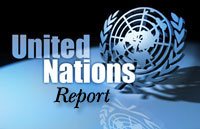UNITED NATIONS (FinalCall.com) – President Barack Obama has taken yet another step in distancing his administration from the past eight years under George W. Bush by announcing U.S. intentions to run for a seat on the 47-nation UN Human Rights Council in May.

The Human Rights Council is a UN inter-governmental body that monitors governments and promotes international human rights.
Ajamu Baraka, executive director of the Atlanta-based U.S. Human Rights Network, told The Final Call that his organization “welcomed” the administration’s decision as an “important first step” in dealing with its responsibility for the human rights of American citizens.
“We have to remain vigilant, and demand that the U.S. uphold those responsibilities under international conventions,” Mr. Baraka added.
The announcement was made through a joint statement by Secretary of State Hillary Rodham Clinton and UN Ambassador Susan Rice saying this further demonstrated the Obama administration’s “new era of engagement.”
The move by the White House came a week after a report surfaced on March 20, the day the UN designates as the International Day for the Elimination of Racial Discrimination, that racist and other violent hate crimes are rising in many parts of Europe and North America.
“In the United States, people of Hispanic origin–both immigrants and American citizens–are facing rising levels of crime driven by prejudice and hatred, marking new trends of rising anti-immigrant violence,” stated Human Rights First, a New York and Washington-based human rights organization.
The group’s “Hate Crime Survey” also stated that “people of African origin were subjected to some of the most persistent and serious attacks in both Europe and North America and that “people of Asian origin faced high levels of racist violence” which was often seen to overlap with “hatred and prejudice toward those of a Muslim background.”
The survey said that the Russian Federation, established in 2008, had a fourth record-setting year in a row for bias motivated murders with 100.
“It has been very difficult getting governments to respond to our surveys. We have to rely on data given to us by non-governmental organizations (NGOs),” Paul LeGendre, director of Human Rights First and co-author of the survey told The Final Call.
Mr. LeGendre said there is a lot more the UN could be doing to push governments to respond to racial violence and report racial incidents to the Human Rights Council. Commenting on the U.S. announcement that it wants to run for a Human Rights Council seat, it is important to the world that the “U.S. is ready to engage with its international partners” on living up to human rights responsibilities, he added.
The organization has put forth a Ten-Point Plan on how governments can strengthen their responses to violent hate crime. Among the recommendations, governments should condemn attacks when they occur, making clear there is zero tolerance for violent crime; instruct and adequately train police and prosecutors on how to investigate and prosecute cases; strengthen criminal laws to cover all forms of bias-motivated violence; and improve the monitoring and data collection and reporting, and insure the accountability of law enforcement.
Mr. Baraka and his organization has long been critical of the way the U.S. responds to requests for information concerning issues of racial violence, racism, discrimination and xenophobia, particularly on the world stage. “The naked hypocrisy of the U.S. helped undermine the nation’s credibility and moral authority, and now President Obama has to repair the damage,” said Mr. Baraka.
The U.S. Human Rights Network challenged the Bush administration in 2008 by submitting a 600-page “shadow report” to the committee reviewing U.S. compliance with the International Covenant on the Elimination of All Forms of Racial Discrimination (ICERD), which was ratified in 1994 by Congress.
The issues raised in the shadow report included the disproportionate impact of hurricanes Katrina and Rita on Blacks; the discriminatory effects of the war on drugs, especially in terms of incarceration rates; police brutality and killings and a spate of anti-immigrant violence.
“Unfortunately, the Bush administration chose to brush aside our concerns which were exposed to the ICERD review committee,” Mr. Baraka said.
However, the committee has requested that the U.S. return to Geneva in 2009 with a response to concerns about residential segregation in the U.S.; criminal justice and police brutality data; felony disenfranchisement and Hurricane Katrina displacement.
The committee also said the U.S. should return in 2009 and show how it is dealing with racial profiling at the federal and state levels; life sentencing without parole for persons under 18, and public awareness of the existence of ICERD.
“Making people aware of ICERD is a major issue,” said Mr. Baraka. The American public remains basically unaware of the existence of most international conventions and the government’s responsibility to live up to them, he added.
Getting back to the Obama administration’s comments on the Human Rights Council, Mr. Baraka told The Final Call that it would only be significant if President Obama reactivates the federal Interagency Working Group on Human Rights, which was established by former president Bill Clinton and ignored by Mr. Bush. The Working Group would coordinate U.S. compliance with its treaty obligations and revitalize the U.S. Civil Rights Commission, including expansion of its mandate to include human rights violations.












